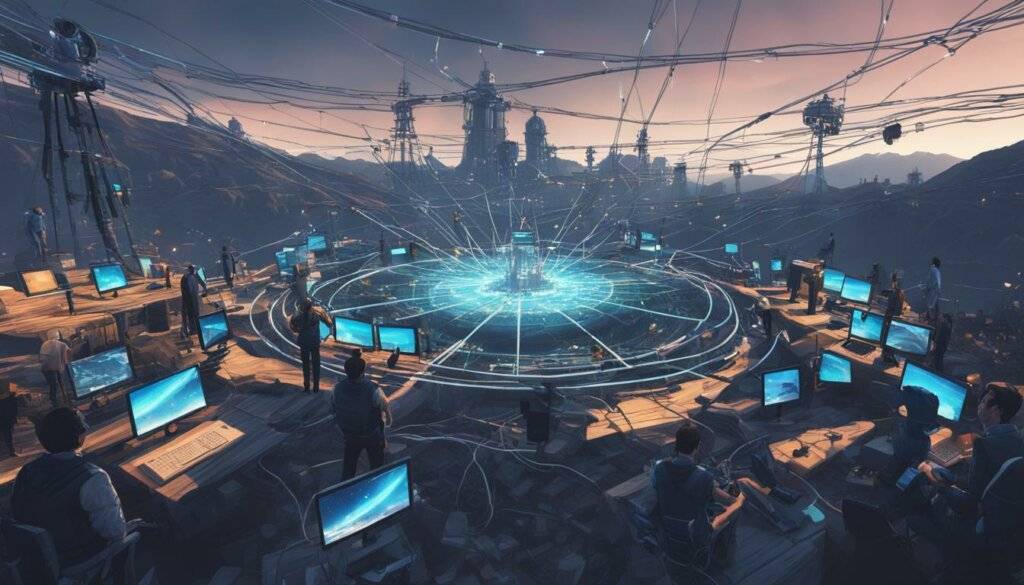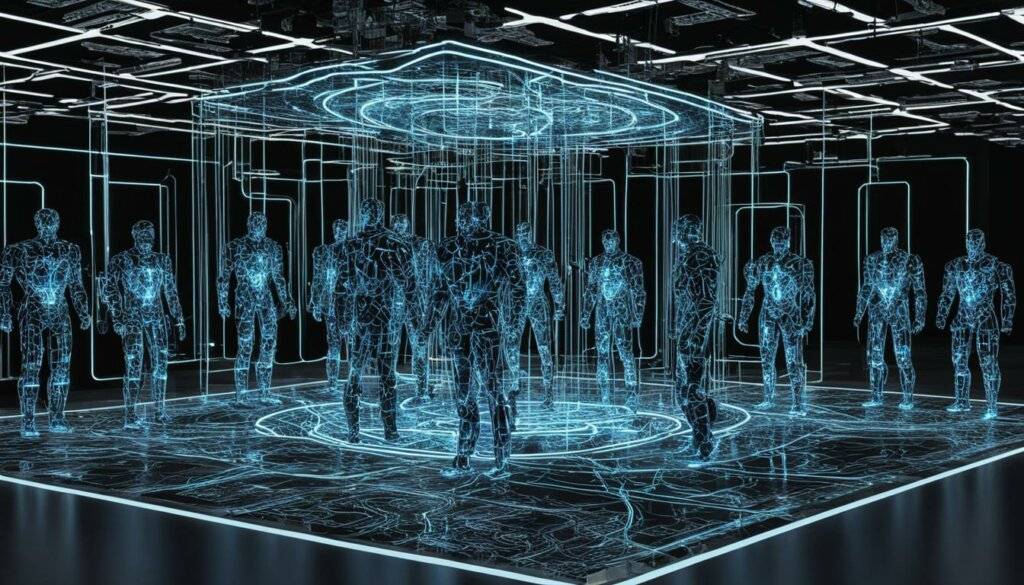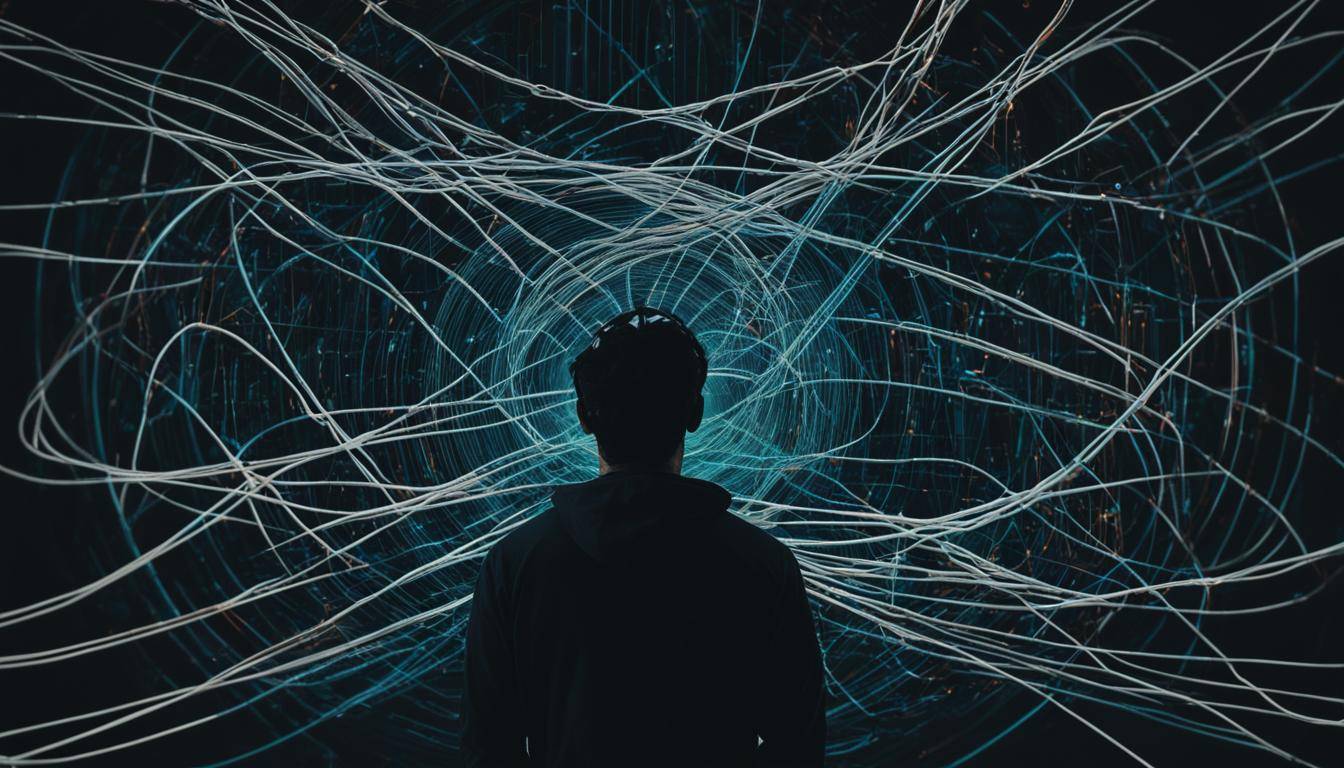The simulation hypothesis is a fascinating concept that proposes the idea that our world, including ourselves, is actually a simulated reality.
According to this theory, humans and the entire universe around us are constructs within a computer simulation, much like a virtual reality or a computer program.
This hypothesis has sparked numerous debates and discussions, ranging from philosophical discourse to practical applications in computing.
While some scientists and physicists criticize the simulation hypothesis as pseudoscience, there are ongoing efforts to validate it through scientific means.
Versions of this hypothesis have even been featured in popular culture, most notably in movies like The Matrix.
Key Takeaways:
- The simulation hypothesis suggests that our reality is a simulated construct within a computer program.
- This hypothesis has been a subject of debate and has gained attention from both philosophers and scientists.
- Efforts are underway to validate the simulation hypothesis through scientific means.
- The hypothesis has also been popularized in movies like The Matrix.
- Exploring this hypothesis raises thought-provoking questions about the nature of our existence and the limits of human potential.
Origins of the Simulation Hypothesis
The concept of a simulated reality is not a new idea; it has been contemplated by philosophers and thinkers throughout history.
Various philosophical perspectives from different cultures touched on the notion that the world may not be as it seems.
These ancient insights laid the groundwork for the modern simulation hypothesis.
Plato’s allegory of the cave, explored in his work “The Republic,” presents the idea that humans perceive a distorted reality, mistaking shadows on a cave wall for the true form of reality. This allegory suggests that what we perceive as real may be an illusion or a mere reflection of a higher reality.
Ancient Greek philosophy delved into questions surrounding the nature of reality, positing the concept of the “Great Illusion” (Phantomike). Ancient Greek philosophers like Heraclitus, Parmenides, and Zeno questioned the stability of the physical world and the reliability of our senses.
“All is flux, nothing stays still,” declared Heraclitus, suggesting that reality is in a constant state of change and that our perception only captures a fleeting glimpse of a deeper reality.
Aztec philosophy, as captured in texts such as the “Codex Mendoza,” reflected the belief that the world we experience is a carefully constructed illusion created by deities or higher beings.
This perspective opens the door to the possibility that our reality is part of a grander scheme beyond our comprehension.
Rene Descartes, a prominent philosopher of the 17th century, introduced the “evil demon” scenario in his Meditations on First Philosophy.
Descartes proposed that an evil demon could be manipulating our minds, deceiving us into perceiving a false reality. This epistemic doubt further deepened the skepticism about the nature of our existence.
These historical perspectives from Plato, ancient Greek philosophy, Aztec philosophy, and Descartes started the inquiry into the nature of reality, paving the way for contemporary explorations of the simulation hypothesis.
The simulation hypothesis challenges conventional notions of reality and offers an intriguing perspective on our existence.
Nick Bostrom’s Simulation Argument
Nick Bostrom, a philosopher, presents a compelling simulation argument that explores the probabilities of our reality being a simulation.
He postulates three possible scenarios: either civilizations never reach a stage where they can create simulated realities, they choose not to create them, or the majority of conscious minds exist within simulated realities.
According to Bostrom, if the third scenario is valid, it would imply that we are likely living in a simulation created by advanced civilizations or descendants. Although his argument faces criticism, it poses a fascinating perspective on the nature of our existence.
“… we can see that if we are going to be interested in philosophizing about these ‘big questions’—fundamental issues about the nature of existence, the meaning of life, and so forth—we are going to have to take seriously the possibility that our reality might be a vast simulation executed in a highly advanced computer” – Nick Bostrom
Bostrom’s simulation argument stimulates dialogue and contemplation, challenging us to question the foundations of our reality. The debate it sparks encourages exploration into the concept of advanced civilizations capable of creating ancestor simulations.
Scenarios of the Simulation Argument
| Scenario | Description |
|---|---|
| Scenario 1 | Civilizations never reach the technological stage to create simulated realities. |
| Scenario 2 | Civilizations choose not to create simulated realities. |
| Scenario 3 | The majority of conscious minds exist within simulated realities. |

The possibilities outlined in Bostrom’s simulation argument shed light on the intricate relationship between advanced civilizations, probabilities, and the potential existence of ancestor simulations.
The implications of this argument extend beyond philosophical thought experiments, intersecting with scientific, technological, and existential discussions.
The Science Behind the Simulation Hypothesis
The simulation hypothesis posits that reality is fundamentally composed of information. This idea aligns with concepts from information theory and quantum mechanics, which suggest a profound connection between the structure of the world and some form of consciousness.
According to the self-simulation hypothesis, reality crystallizes based on observations and efficient language-based rules.
It proposes that the act of observation plays a crucial role in transforming unreal information into physical reality, challenging traditional interpretations of quantum mechanics.
“Reality is a fabrication based on conscious perception, where observation and the language used to express it define the fundamental nature of existence.”
Information theory, a field that explores the transmission and processing of information, provides insights into how data shapes our understanding of reality.
It suggests that the universe can be seen as a vast computation, where the underlying fabric consists of binary states and the rules governing their interactions.
Quantum mechanics, on the other hand, delves into the microscopic realm of particles and waves, revealing strange phenomena such as superposition and entanglement.
These phenomena challenge conventional notions of reality and imply that consciousness may play a role in shaping the physical world.
The Role of Consciousness in Reality
The connection between consciousness and reality is a subject of both scientific inquiry and philosophical contemplation. Some theories propose that consciousness is not merely an emergent property of the brain but a fundamental aspect of the fabric of reality itself.
Supporters of this viewpoint argue that conscious awareness and observation are essential for the existence and manifestation of the physical world.
They suggest that conscious beings serve as agents that collapse the wave function, transforming the probabilistic nature of quantum mechanics into concrete reality.
The self-simulation hypothesis expands on this idea, positing that individual consciousness is intricately intertwined with the creation and maintenance of the simulated reality we experience.
Under this hypothesis, the observed world arises from the interactions between conscious entities and the information-based rules governing the simulation.
Understanding the Nature of Reality
By exploring the science behind the simulation hypothesis, we gain insights into the profound interplay between information, consciousness, and the nature of reality itself.
It challenges conventional interpretations of quantum mechanics and opens up new avenues for understanding our existence.
As our scientific understanding progresses, further research is needed to unravel the mysteries surrounding consciousness, information theory, and the simulation hypothesis.
This ongoing exploration holds the potential to reshape our understanding of the fundamental nature of reality and our place within it.

Implications of the Simulation Hypothesis
The simulation hypothesis has profound implications across various fields, shedding new light on our understanding of reality.
These implications span from addressing the environmental crisis and advancements in AI and quantum computing to challenging the limits of human potential and offering an intriguing perspective on unidentified anomalous phenomena.
1. Addressing the Environmental Crisis
The pressing environmental crisis we face calls for a deeper understanding of reality. By exploring the simulation hypothesis, we can gain insights into the interconnectedness of our actions and the impact they have on the environment.
Recognizing the complexity of the crisis within the context of a simulated reality can inspire innovative solutions and responsible stewardship.
2. Advancements in AI and Quantum Computing
The simulation hypothesis prompts us to reconsider the boundaries of technological advancements. AI and quantum computing challenge our perception of what is achievable through human innovation.
If our reality is indeed a simulation, then the exponential growth of AI and breakthroughs in quantum computing may be an intrinsic part of the simulation itself, encouraging us to push the boundaries of technological progress.
3. Exploring Human Potential
Delving into the simulation hypothesis compels us to question the limits of human potential. If our reality is simulated, then our capabilities may extend beyond conventional constraints.
By embracing this perspective, we can unlock new possibilities and strive to reach heights previously unimaginable, pushing the boundaries of what it means to be human.
4. Unidentified Anomalous Phenomena
The simulation hypothesis offers a unique lens through which to view unidentified anomalous phenomena. These phenomena, such as UFO sightings or unexplained events, may be glitches in the simulation or intentional interventions by the simulation’s creators.
This perspective encourages both skeptics and believers to reevaluate these phenomena and consider alternative explanations within the context of a simulated reality.
By exploring the implications of the simulation hypothesis, we are prompted to question our understanding of reality, embrace technological advancements, unlock our true potential, and reassess the enigmatic occurrences that surround us.
The Urgency to Understand Reality and Protect the Environment
The urgent need to understand reality through a predictive quantum gravity theory is paralleled by the accelerating environmental crisis. The consequences of human activities, such as ecosystem collapse, biodiversity loss, and climate change, highlight the dire state of the Earth.
To avoid catastrophic outcomes, it is crucial to recognize the impact of human activities on the planet and take immediate action to preserve and protect the environment.
Sustainable practices and environmental conservation efforts must go hand in hand with a deeper understanding of reality.
Consequences of Human Impact on Earth
The consequences of human impact on Earth have reached alarming levels. Coral reef destruction, caused by factors such as pollution and climate change, not only disrupts delicate marine ecosystems but also poses a significant threat to the livelihoods of coastal communities and biodiversity.
Rainforest depletion, fueled by deforestation and unsustainable agricultural practices, leads to the loss of crucial habitats for countless species and exacerbates climate change by reducing carbon sequestration.
Additionally, the loss of biodiversity threatens the delicate balance of ecosystems and diminishes the Earth’s resilience in the face of environmental challenges.
The Role of a Deeper Understanding of Reality
A deeper understanding of reality is essential to address the environmental crisis effectively. This understanding can be achieved through the exploration of predictive quantum gravity theories that provide insights into the fundamental laws governing the universe.
By grasping the intricate connections between the physical world and consciousness, we can develop a holistic perspective and make informed decisions to protect the environment.
Moreover, a deeper understanding of reality can inspire innovative solutions to mitigate the impacts of climate change, conserve biodiversity, and promote sustainable practices.
Environmental Conservation Efforts
Protecting the environment requires collective action and the implementation of sustainable practices. Governments, organizations, and individuals must work together to reduce carbon emissions, promote renewable energy sources, conserve natural habitats, and support sustainable agriculture.
Education and awareness play a crucial role in encouraging environmentally conscious behaviors. By fostering a sense of responsibility towards the environment, we can empower individuals to make informed choices that contribute to the preservation of the Earth.
Conclusion
The simulation hypothesis remains a subject of ongoing debate and exploration. While critics argue for its limitations and pseudoscientific nature, the hypothesis offers a unique perspective on reality that challenges existing theories.
It opens up intriguing possibilities for understanding the nature of our existence.
Further research and exploration in the fields of quantum mechanics, consciousness, and computer science hold the potential to shed more light on the simulation hypothesis.
By delving deeper into these areas, scientists and philosophers can delve into the intricacies of our reality and investigate the fascinating intricacies of a simulated existence.
As we navigate the uncertainties of the 21st century, questioning and seeking a deeper understanding of our reality is crucial.
The simulation hypothesis debates push the boundaries of human knowledge, and future explorations will play a significant role in shaping our comprehension of the world around us. Whether it confirms or refutes the hypothesis, the quest for knowledge remains essential.
FAQ
What is the simulation hypothesis?
The simulation hypothesis proposes that the world we experience is actually a simulated reality, suggesting that humans and the world around them are constructs within a computer simulation.
Is the simulation hypothesis considered pseudoscience?
While some scientists and physicists criticize the hypothesis as pseudoscience, efforts are being made to validate it through scientific means.
Where can I find references to the simulation hypothesis in popular culture?
Versions of the hypothesis have been featured in science fiction, popularized by movies like The Matrix.
How does the simulation hypothesis relate to historical philosophical perspectives?
The concept of a simulated reality has been contemplated throughout history by various philosophers and thinkers, including Plato’s allegory of the cave, ancient Greek philosophy, and Aztec philosophical texts.
What is Nick Bostrom’s simulation argument?
Nick Bostrom, a philosopher, formulated the simulation argument to assess the probability of our reality being a simulation.
He proposes three possible scenarios: civilizations never reach a stage where they can create simulated realities, they choose not to create them, or the majority of conscious minds exist within simulated realities.
How does the simulation hypothesis connect to information theory and quantum mechanics?
The simulation hypothesis aligns with the idea that reality is fundamentally made of information. This connection is explored through concepts from information theory and quantum mechanics, suggesting a connection between the structure of the world and some form of consciousness.
What are the implications of the simulation hypothesis?
The simulation hypothesis raises important implications across various fields such as addressing the environmental crisis, exploring advancements in AI and quantum computing, reconsidering the limits of human potential, and offering a new perspective on unidentified anomalous phenomena.
Why is understanding reality and protecting the environment urgent?
The urgent need to understand reality through a predictive quantum gravity theory is paralleled by the accelerating environmental crisis, highlighting the dire consequences of human activities such as coral reef destruction, rainforest depletion, and biodiversity loss.
Deeper understanding of reality must go hand in hand with sustainable practices and environmental conservation efforts.
What is the conclusion regarding the simulation hypothesis?
The simulation hypothesis remains a subject of ongoing debate and exploration.
While critics argue for its limitations and pseudoscientific nature, further research and exploration in the fields of quantum mechanics, consciousness, and computer science may shed more light on the nature of our existence.




























































